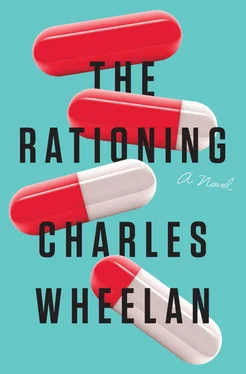So it is with lurking viruses. How and why does an organism that can live in perfect symbiosis with its host for years or decades suddenly turn deadly? Even more bizarre, the same virus will often return to its benign state months or years later. Imagine that the virus for the common cold suddenly became as virulent as smallpox, wiping out a large percentage of the infected population. Then a few years later the virus goes back to causing sniffles and a sore throat. The exact same virus. This is not a mutation, or a different strain. The guy goes to work one day and celebrates a receptionist’s birthday in the conference room, sharing the cake and chuckling at the bad rendition of “Happy Birthday.” The next day he tries to shoot as many of his coworkers as possible. But then a year later, this deranged killer would ask his jailers, “Hey, when can I go back to work?”
As one of my graduate school professors once said, “It defies everything we think we know about evolution.” A tiger is not supposed to change its stripes, at least not suddenly. And if there were a sudden change—some kind of major genetic mutation that bestows a reproductive advantage—why would the organism change back? A virus typically lives without doing serious harm to its host (the common cold), getting passed along successfully. Or it kills violently (Ebola), using the dead victim (bleeding from every orifice) as a virus bomb that propagates the deadly organism to more hosts. But not both. It was hard to reconcile what we observed in lurking viruses with the most fundamental tenets of biology.
The prevailing theory was that some kind of “trigger” causes a lurking virus to go rogue, and then later to return to normal, like some kind of genetic on/off switch. Obviously, if we could identify that switch, we could in theory turn dangerous viruses “off,” or turn benign viruses “on.” This was the potential cancer link. Tumors are benign cells that begin dividing out of control—workplace shooters. Might there be a similarity between the hypothetical on/off switch in lurking viruses and the trigger that turns normal human cells into devastating malignant tumors?
When I began my research, lurking viruses had never been found in humans. In fact, there had been no documented cases of a lurking virus infecting any warm-blooded vertebrate. The most common hosts are amphibians, particularly in the tropics. My research took me to the Amazon basin, where I spent ten months collecting data on two species of tree frog. My Dartmouth classmates, many of whom had gone on to business and law school, liked to joke that I had gone off to climb trees in the jungle. Their observation was not entirely inaccurate; both species of frog are easiest to find just below the canopy, where they are safest from predators. I did literally climb trees, usually with the benefit of a ladder. But the jungle comments also had a tinge of judgment, as if my doctoral research were some kind of escape from “real” work. I found it amusing when I was in a good mood—and irksome when I was not—that my peers who were finding better ways to sell snack foods, or engineering mergers between giant oil companies, had the chutzpah to tell me I was shirking my social responsibility.
Anyway, these two species (the Abiseo climbing frog and the black-eyed tree frog, for anyone who cares) were nearly wiped out by a parasitic virus beginning in the early 2000s. That was no big deal; species come and go, especially in the Amazon. But in 2016, a savvy Brazilian researcher made a startling discovery. These tree frogs had always been hosts for this parasitic virus—literally for millions of years—but for nearly all of that time the virus did not kill them. He had excavated a tar pit near an Amazon tributary where a whole ecosystem from two million years ago had been preserved intact—the biological equivalent of Pompeii. The site was (and still is) a treasure trove for biologists. The finding that interested me was just a footnote to the many other extraordinary discoveries. Two million years ago, these two tree frogs were infected by the same parasitic virus that would later nearly wipe out their species, but they were seemingly unaffected by it. The tree frogs trapped in the tar pit all carried the virus, but analysis of the preserved tissue suggested that they died with the virus, not from it. The relationship between the host and the parasite was innocuous, maybe even symbiotic, just like all the organisms inhabiting the human gut. Happy tenants.
So what changed? And why? Those were the central questions of my doctoral dissertation. The dissertation was mediocre by any conventional standard. That was one reason I could not find an academic job. I loved my work at the NIH, but I had “settled” when I first agreed to work there. Scientists have their own hierarchies. The researchers at the preeminent academic institutions are at the top: Harvard, Yale, and so on. The big state universities are next; what they lack in prestige they make up for in grants, facilities, and access to graduate students. Then there are the government research facilities, places like NIH and CDC, where the quality of research is good, but there are fewer freedoms than at a university. My research had its merits. I had thoroughly documented spells in which the Amazonian tree frogs had been harmlessly infected with lurking viruses and also periods during which the viruses had nearly wiped out the affected populations. Nobody had ever done this kind of fieldwork before. Still, when I gave my academic job talks (I did apply for openings in biochemistry at a handful of research universities), the faculty panels would always ask the same thing: “Why?” I had no answer, not even a compelling theory to test (which might have earned me a job at a second-tier university).
I was the guy who came in after a mass killing and explained exactly how the killer had behaved on the day of the shooting. I could outline exactly what happened and when—but not why some twenty-one-year-old decided to open fire on his professors and fellow students. And why is really what we care about, as that is what we need to know to prevent the next campus shooting.
I was cursed with a particularly unimaginative dissertation adviser, who discouraged a line of inquiry that might have led to more robust answers to these questions. This caused a profoundly uncomfortable moment at my dissertation defense. “I don’t see how you have moved the research frontier,” my adviser declared. I was standing at the front of a small seminar room filled with a smattering of fellow students, family members, curious faculty members, and the three professors who would determine whether I would become a Ph.D. or a failed graduate student, the dreaded ABD (All But Dissertation). My adviser was the chair of that committee and its most influential member.
“My work provides a deeper understanding of how lurking viruses function within their hosts,” I answered.
“But it’s not your work. You’ve summarized the work of others,” my adviser pressed. He was sitting in the back of the room; the other observers turned to look at him, then turned back to hear my response, like an academic game of tennis. My mind was working furiously, trying to figure out if he was trying to screw me or just make me sweat a little.
“There were various strands of research on this topic, each isolated in its own way,” I said with far more confidence than I was feeling. “When you bring them together—well, that’s what I’ve done here—you get a more complete understanding of how the organisms interact.” I was thinking, What the fuck? This guy has been working with me for three years and now he brings this up?
“Hmm,” my adviser said with mild disdain. “You have successfully woven together work already published by others—”
Читать дальше












